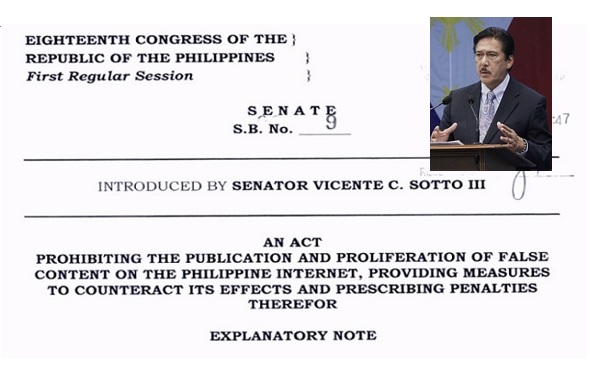
The anti-fake news bill filed by Senate President Vicente C. Sotto III violates international law and , if passed, will “effectively silence and prohibit any speech” the government does not like, the International Center for Not-for-Profit Law said in its analysis of “Anti-Fake Content Act” filed on July 1, 2019.
In the conclusion of its analysis of the Sotto bill, ICNL said, “This Act enables the Government of the Philippines to effectively silence and prohibit any speech it does not like. In addition to censoring such speech – which is itself an unlawful restriction to the freedom of expression – the Act provides for overly harsh criminal penalties to the creators, authors, producers and publishers of content deemed to be ‘false’ or ‘misleading to the public.’”
“Laws that criminalize ‘fake news’ violate international law protecting the freedom of expression, “ ICNL said.
ICNL provides technical assistance, research and education to support the development of appropriate laws and regulatory systems for civil society organizations in countries around the world.
In filing the bill which imposes penalties up to P2 million or imprisonment for violators, Sotto said, “Filipinos have fallen prey to believing most of the click-baits, made up quotes attributed to prominent figures and digitally altered photos. This bill seeks to protect the public from the adverse effects of false and deceiving content online. It also seeks to promote responsible use of the internet”
ICNL said, “Laws that contain criminal sanctions for publishing ‘false’ content are not permissible tools to address the proliferation of disinformation.”
The international non-profit law group, said the solution to fight online disinformation is for States to “undertake a series of social programs including education, supporting systems of self regulation in the media, and encouraging all stakeholders – including intermediaries, media outlets, civil society and academia – to develop inclusive, transparent initiatives that generate better understandings of the negative consequences of disinformation.”
ICNL also said the Sotto bill contains two types of penalties that run afoul of Article 19 of the International Covenant on Civil and Political Rights, to which the Philippines is a signatory: the blocking of websites; and criminal penalties.
Article 19 of the ICCPR enshrines the right to freedom of expression.
ICNL noted that in the Sotto bill, the DOJ has the sole authority to block websites and social media accounts. It is empowered to take this action without oversight. The rationale for blocking websites and filtering of content will be based on an individual or legal entity publishing content that the DOJ deems to be “false” or that “would tend to mislead the public.”
“The blocking of websites as called for in the Act violates international law,” ICNL said.
ICNL also took note that the Sotto bill provides for draconian criminal penalties, including long prison sentences and large fines for anyone that participates in the publication, sharing or financing of any content that is “false” or that “would tend to mislead the public,” or for anyone who does not comply with an order from the DOJ, regardless of whether such non-compliance is deliberate or negligent.
Specifically, the Act mandates that anyone violating Section 4(a) or 4(b) shall receive six (6) to twelve years (12) in prison, or a fine of not more than 300,000 Pesos or both. For violating Section 4(c), 4(d) or 4(e), the punishment may be a prison sentence of twelve (12) to twenty (20) years, or a fine of not more than 300,000 Pesos or both.
ICNL said, “Most troubling is that if the content in questions ‘undermines the public interest,’ the Act requires that the maximum prison penalty be imposed, i.e. twelve (12) or twenty (20) years depending on the offense.”
“These criminal penalties are exceedingly harsh punishments for sharing news, ideas and opinion. They are disproportionate to any harm caused by speech that is deemed to be ‘false’ or ‘that would tend to mislead the public’ – particularly those penalties providing for long sentences, which in some cases are explicitly required. As such Section 5 of the Act fails the third prong of Article 19’s three-part test.”
ICNL’s analysis complements the findings of Tsek.ph which fact-checked mis and disinformation during the last election period.
Written by Yvonne Chua and Jake Soriano, the analysis of Tsek.ph, a pioneering collaborative fact-checking initiative between 11 newsrooms and three universities, showed Sotto’s bill “rests on certain assumptions, such as framing ‘fake news’ as if it were only a social media problem where the problem persists both online and off.”
“By seeking to penalize only ‘false and deceiving content online,’ the bill neglects disinformation that spread through other vectors, which Tsek.ph data show were as prominent during the midterms as those on social media,” Chua and Soriano said.
Be First to Comment